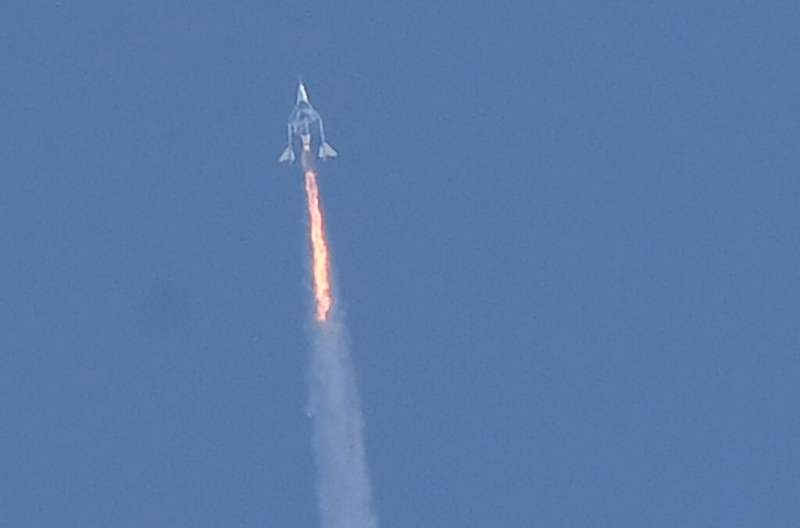
[ad_1]

Virgin Galactic’s SpaceShipTwo uses a type of synthetic rubber as fuel and burns it in nitrous oxide, a potent greenhouse gas.
After years of waiting, Richard Branson’s trip to space this month aboard a Virgin Galactic ship was supposed to be a triumphant return. Instead, the getaway drew a lot of criticism regarding its carbon footprint.
With Jeff Bezos set to launch on a Blue Origin rocket on July 20, and Elon Musk’s SpaceX planning a fully civilian orbital mission in September, the nascent space tourism industry faces tough questions about its environmental impact.
At present, rocket launches as a whole do not occur often enough to cause significant pollution.
“Carbon dioxide emissions are completely negligible compared to other human activities or even commercial aviation,” Gavin Schmidt, NASA’s chief climate advisor, told AFP.
But some scientists are worried about the potential for longer-term damage as the industry is poised for significant growth, especially impacts on the still poorly understood upper atmosphere ozone layer.
Virgin Galactic, which has been criticized in editorials on CNN and Forbes, as well as on social media, for sending its billionaire founder into space for a few minutes in a fossil-fuel-hungry spacecraft, claims its carbon emissions are roughly equivalent to a business class ticket from London to New York.
The company “has already taken steps to offset carbon emissions from its test flights and is examining opportunities to offset carbon emissions for future customer flights and reduce the carbon footprint of our supply chain. “she said in a statement to AFP.
But while transatlantic flights carry hundreds of people, Virgin’s emissions stand at around 4.5 tonnes per passenger on a six-passenger flight, according to an analysis published by French astrophysicist Roland Lehoucq and his colleagues in The Conversation.
That’s roughly equivalent to driving a typical car around the Earth, and more than double the annual individual carbon budget recommended to meet the goals of the Paris climate agreement.
“The problem here is really one of disproportionate impacts,” Darin Toohey, an atmospheric scientist at the University of Colorado, Boulder, told AFP.
“I actually grew up in the space program and it got me into science … but if someone gave me a free ride I would be very nervous to take it because I would know that my own footprint is way bigger than it should be, “he said.
Cleaner fuels possible
Virgin Galactic’s SpaceShipTwo uses a type of synthetic rubber as fuel and burns it in nitrous oxide, a potent greenhouse gas.
The fuel pumps carbon black into the upper stratosphere, 30-50 kilometers (18-30 miles) high.

Blue Origin’s New Shepard rocket burns liquid hydrogen and oxygen, which turns into water vapor.
Once there, these particles can have multiple impacts, ranging from reflecting sunlight and causing a nuclear winter effect, to accelerating chemical reactions that deplete the ozone layer, which is vital. to protect people from harmful radiation.
“We could be at a dangerous point,” said Toohey, who wants more scientific investigation into these effects before launches become more frequent.
Virgin has said it wants to make 400 flights a year.
Compared to Virgin Galactic’s SpaceShipTwo spaceplanes, Blue Origin’s are much cleaner, according to a recent article by scientist Martin Ross of Aerospace, which Bezos’ company tweeted.
This is because it burns liquid hydrogen and liquid oxygen, which burn off as water vapor.
Ross’s article found that Blue Origin’s reusable vertical-launch rocket causes one hundred times less ozone loss and 750 times less magnitude of climate forcing than Virgin’s, according to rough calculations.
But that doesn’t mean it’s totally clean.
“It takes electricity to make liquid oxygen and liquid hydrogen,” Ross told AFP.
“You can go back and calculate the amount of electricity used to make the thruster,” he said. “It depends how far you look in the supply chain.”
Shame of space?
The impact of suborbital launches such as those from Virgin and Blue Origin is pale compared to the impact of rockets reaching orbit.
When SpaceX sends four private citizens into space in September, it will use its Falcon 9 rocket, which is calculated to produce the equivalent of 395 carbon emissions transatlantic flights.
“We live in an era of climate change and launching an activity that increases emissions as part of a tourist activity is not the right timing,” Annette Toivonen, author of the book “Sustainable Space,” told AFP. Tourism “.
The world is much more aware of the climate crisis today than when these companies were founded in the early 2000s, and this could encourage companies to look for ways to minimize pollution through cleaner technologies to anticipate the problem. .
“Who would want to be a space tourist if you can’t tell people that you are a space tourist?” Argued Toivonen, who teaches at the Finnish Haaga-Helia University of Applied Sciences.
Branson mom on when he launches into space on Virgin Galactic
© 2021 AFP
Quote: Environmental concerns increase as space tourism takes off (2021, July 18) retrieved July 19, 2021 from https://phys.org/news/2021-07-environmental-space-tourism.html
This document is subject to copyright. Other than fair use for private study or research purposes, no part may be reproduced without written permission. The content is provided for information only.
[ad_2]
Source link